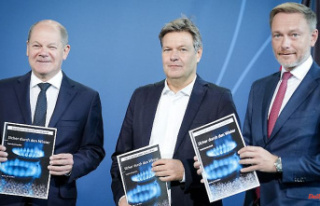In 2008, in Ceausescu's dictator's palace, German Chancellor Merkel prevented Ukraine from joining NATO immediately. Today, the foreign ministers of the alliance discuss winter aid for the invaded country at the historic site. Foreign Minister Baerbock chooses strong words.
A monstrous building in the style of a confectioner, marble staircases and crystal chandeliers as well as endless corridors leading to a thousand rooms and 400 halls: the foreign ministers of the 30 NATO countries will meet in Bucharest in the ostentatious palace of the former Romanian dictator Nicolae Ceausescu until Wednesday. The place is highly symbolic for NATO. There, in 2008, the heads of state and government of Ukraine pledged membership in the military alliance.
"NATO welcomes the Euro-Atlantic aspirations of Ukraine and Georgia to join NATO. We agreed today that these countries will become members of NATO," said the closing statement of the Bucharest NATO summit almost 15 years ago. To date, the promise has not been fulfilled. However, the alliance countries support Kyiv in the Russian war of aggression in an "unprecedented way", as General Secretary Jens Stoltenberg emphasized in Bucharest.
In the Romanian capital, the United States, Germany and other allies promised further help to get Ukraine through the winter. According to Stoltenberg, this includes "non-lethal" support with winter clothing, medicines, mine clearance equipment or drone jamming systems. But the Ukrainian air defense must also be further strengthened, said the Secretary General.
"Russian terror begins 250 kilometers from here," said Federal Foreign Minister Annalena Baerbock, referring to the conference venue. On the sidelines of the NATO meeting in Bucharest, she consulted with the foreign ministers of the seven major industrialized countries (G7) and up to 20 partner countries. It was about help to rebuild Ukraine's energy infrastructure, which was severely damaged by the recent series of attacks. According to Baerbock, Germany wants to deliver generators and ambulances, among other things.
Baerbock also described the Russian war of aggression against neighboring Ukraine as a "break in civilization". The Green politician uses a term that is often used to describe the Holocaust. This in turn is the term used almost worldwide for the genocide of Europe's Jewish population by the National Socialists with around six million dead. Baerbock says specifically: "We are witnessing in a brutal way that the Russian President is now using cold as a weapon of war - a brutal break not only with international law, but with our civilization." The bombing of infrastructure means that families with young children have to live in sub-zero temperatures without electricity, water and heat.
With this and the extensive military aid, the NATO countries have demonstrated since the Russian attack a good nine months ago that "NATO's door is open" to Ukraine, Stoltenberg said in Bucharest - "not only in words but also in deeds ". This is not enough for Eastern European alliance countries such as Poland and the Baltic States: They want to speed up Ukraine's accession process and thereby fulfill President Volodymyr Zelensky's demands. In Bucharest, the Czech Republic also called for a "new approach" to Ukraine's accession.
There are many in Eastern Europe who believe that NATO's 2008 summit compromise was a historic mistake. At that time, Chancellor Angela Merkel, together with France and other countries, slowed down US President George W. Bush, who urged the alliance to immediately admit Ukraine as well as Georgia. The current NATO Secretary General, Stoltenberg, as the Norwegian head of government, was also one of the critics of the membership. A promise of admission without a target date was issued at the summit. "Russia is a partner," Merkel was able to announce at the end of the Bucharest summit, which Russian President Vladimir Putin even attended in person.
If NATO had accepted Ukraine and Georgia back then, Putin would never have attacked both countries, critics of Merkel believe, including in Eastern Europe. Russian troops invaded Georgia in the summer of 2008, in 2014 Russia annexed the Ukrainian Crimean Peninsula, and in February of this year the war of aggression across Ukraine followed.
Ukraine is unlikely to come any closer to NATO membership in Bucharest, even if Foreign Minister Dmytro Kuleba travels personally to dinner. Because Germany, but also the USA under President Joe Biden, have no interest in letting NATO get involved in the war with Russia. Pushing for Ukraine's membership now would be completely "irresponsible," it said in Bucharest.












